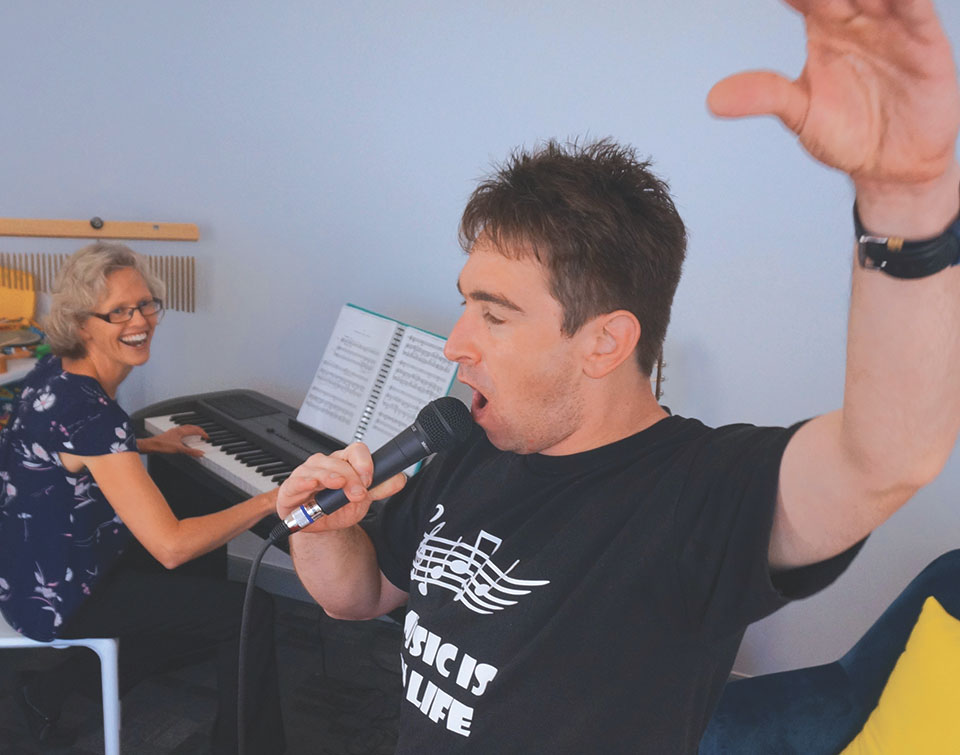NDIS POLICIES
AND PROCEDURES
Privacy and Confidentiality
Your Information
We need to know some things about you.
There are laws to make sure your information is kept private. These laws say:
– how we can collect information
– how we store information
– who can see your information
– what we do with your information
Your personal information belongs to you
We need your permission to collect information about you. And to share your information.
You don’t have to give permission.
Your information helps us provide good and safe services.
We only ask for information we need. We will tell you why we need it. That includes photos and videos too.
If you don’t understand why we need information, it’s OK to ask us.
Keeping it safe
We will protect your information and only use it for the right reasons, and only show the right people.
The people who work with you need to see your information. It helps them deliver better services.
We will only share your information if:
– you give permission to share it, or
– we are very worried about your safety, or
– if the law requires us to share it.
You can see your information too. Just ask us.
Keeping it correct
If your information is not correct, we may be unable to do a good job.
Give us correct information, and help us keep it up-to-date.
If your personal information changes, please let us know. Moved house? New phone number? New service provider? New contact? — remember to tell us!
We will also check your information regularly, and update it.
If we didn’t respect your privacy…
Write to us:
16/363 Hillsborough Rd
Warners Bay, NSW, 2282
Phone us:
0410 834 885
You can contact the Office of the Australian Information Commissioner
web: www.oaic.gov.au
email: enquiries@oaic.gov.au
post: GPO Box 5218
Sydney NSW 2001
phone: 1300 363 992
TTY: 133 677
Speak and Listen: 1300 555 727
Interpreters can be arranged on 131 450.
Please get in touch to discuss this policy further.
Find an advocate
What is an advocate?
An advocate is trained to speak for you.
If you are not sure how to find an advocate, we can help.
Advocates are a free service.
The National Disability Advocacy Program can help you work with an advocate.
Email them at:
disabilityadvocacy@dss.gov.au
Or write to:
Disability, Employment and Carers Group
Department of Social Services
GPO Box 9820
Canberra ACT 2601
Or search “disability advocate” online.

Your Rights and Responsibilities
Your right to be treated well
We will treat you with respect and dignity.
We will treat you fairly and speak honestly.
We will protect your personal information and only use it for the right reasons.
We will provide good quality services that suit your needs, age, lifestyle and cultural background.
Your right to participate
You have the right to a safe and comfortable place to use the service.
You have the right to make choices and decisions about the services you receive.
You have the right to the information you need to make good choices.
You have the right to have someone help you make the best choices – an advocate or support person.
You have the right to get help accessing services in the community.
Your right to speak out
You have the right to complain about the service.
You have the right to a reply as quickly as possible.
If you still are not happy, you have the right to complain again, or talk with the NDIS Commission.
You can help
Make sure to update your contact information as it changes.
Keep your appointments – or let us know if you can’t.
Choose someone to support you make decisions – an advocate, friend or family member.
Treat other people with fairness, honesty and respect.
Respect other people’s right to a safe and comfortable environment.
Respect other people’s right to privacy and confidentiality.
Give us honest feedback about our services.
If we don’t respect your rights, tell us.
Write to us:
16/363 Hillsborough Rd
Warners Bay, NSW, 2282
Phone us:
0410 834 885
You can contact the NDIS Commission
web: www.ndiscommission.gov.au
phone: 1800 035 544
TTY: 133 677
Interpreters can be arranged.
Please get in touch to discuss this policy further.
Find an advocate
What is an advocate?
An advocate is trained to speak for you.
If you are not sure how to find an advocate, we can help.
Advocates are a free service.
The National Disability Advocacy Program can help you work with an advocate.
Email them at:
disabilityadvocacy@dss.gov.au
Or write to:
Disability, Employment and Carers Group
Department of Social Services
GPO Box 9820
Canberra ACT 2601
Or search “disability advocate” online.
Feedback and Complaints
Your feedback helps us to improve, so that you will feel safer, happier and get more out of our services.
We will often ask you for feedback. You can also comment or complain at any time. You can use this brochure, or phone us, or ask our staff to help. They will make sure the right people get your message. Your complaint will be kept private.
When you tell us what you like or don’t like, we will listen. And we will try to change things if we can.
You will always receive a reply as quickly as possible.
Compliments and complaints
To give you better and better services, we need your feedback.
Feedback can be compliments, comments or complaints.
We love to hear compliments. That means we are getting it right. If you are happy, we are happy!
If you are not happy, tell us. It’s OK to complain. We won’t be angry. So don’t be shy. We need to know how you feel. Help us to do better!
We will always listen and reply to complaints, as quickly as possible.
You can complain anonymously. If you don’t leave your name, we can’t reply to your complaint. But we will still try to make things better.
It’s OK to complain!
Get help to complain
– from our workers
– from your family or friends
– from an advocate
– from the NDIS Commission
You don’t have to talk with us.
If you have a serious complaint, you can tell the NDIS Commission.
What if I’m involved in an incident?
Your safety is very important to us.
We work hard to deliver safe services.
But sometimes accidents happen. Sometimes people make mistakes or treat other people badly. We call these things ‘incidents’.
You can help prevent incidents happening too. Act safely. Treat other people with respect.
And if you don’t feel safe, tell someone about it.
Feeling safe; being safe
NDIS providers must follow rules about keeping people safe. We work hard to keep everyone safe. That means you, our workers and other people in the community.
We think about how accidents can happen and how to prevent them. This is called ‘risk management’.
We ask you questions, and think about the supports we provide, about the places where those supports happen, about the people who work with you and other people around you.
We want everyone to be safe, and to feel safe. If you feel unsafe, you can tell us. We promise to listen.
If something goes wrong
Our staff know what to do if there is problem or accident.
We follow NDIS rules if an incident happens.
1. We must tell the NDIS Commission
2. We must investigate the incident
3. We must do something so that the incident doesn’t happen again
4. We must talk about all this with the person who was hurt.
We must follow these rules if someone gets hurt, if someone says they have been hurt, or if staff treat NDIS participants badly.
If you don’t feel safe to talk with our staff, then tell someone else. You can talk with your family and friends, or an advocate. You should complain to the NDIS Commission — they make the rules and help participants when people break the rules.
Making it right again
Everyone has the right to be treated fairly.
If you are involved in an incident, you have the right to know what went wrong and what is being done to make it right.
If you don’t get these answers, you have the right to complain.
We will always keep you informed. We want to treat you with respect.
If you are unhappy with our complaints process, you have the right to get help.
The NDIS Commission can help. An advocate can help too, by speaking for you.
Please get in touch to discuss this these policies further.
Find an advocate
What is an advocate?
An advocate is trained to speak for you.
If you are not sure how to find an advocate, we can help.
Advocates are a free service.
The National Disability Advocacy Program can help you work with an advocate.
Email them at:
disabilityadvocacy@dss.gov.au
Or write to:
Disability, Employment and Carers Group
Department of Social Services
GPO Box 9820
Canberra ACT 2601
Or search “disability advocate” online.

Our Address
16/363 Hillsborough Road
Warners Bay NSW 2282
